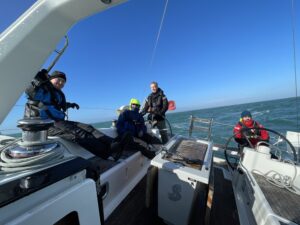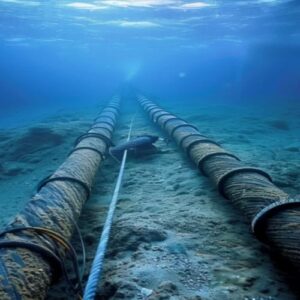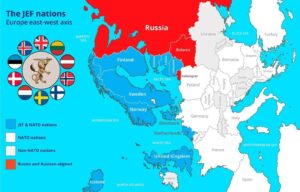Certain months seem to lend themselves to thinking about certain topics.
For me, January always turns my thoughts to the Sea.
Researching on energy at the start of term has this year encouraged reflection on seaborne threats to UK energy and data transmission posed by state actors in the Baltic, more so as the US has another of its periods of wild foreign policy instability.
Island Life
Some context – I was privileged to live on Jersey for part of my life. For those that may be hazy on channel island geography – Jersey is an island of 4 by 9 miles long, situated about 85 miles off the coast of the UK, and 14 miles from the coast of Normandy, France. Its difficult to live in Jersey and not interact with the sea, in some way. It has a long maritime and naval tradition, an independent mindset, its own laws, preferential tax rates, own currency and is a crown protectorate.
What it is not independent in, however, is food production, energy generation or data transmission.

Whilst food deliveries to Jersey supermarkets arrive via boat from the UK, energy and data is piped in, literally, via undersea cable.
There were occasions when the entire island had no internet because a fishing boat had managed to snag/drag the undersea cable bringing data to the island with nets or anchor – which incidentally causes no end of consternation if you happened to be accountable for running the digital and technology function of a major bank, premised in Jersey.
But enough of my problems …
Small Island, Big Island
So what have the challenges of a tiny island off the coast of France, and its murky undersea cabling to do with UK infrastructure vulnerability, you may well ask ?
Well, Jersey is a microcosm of the UK. Here’s some fun facts:
- Approximately 95% of international data traffic is transmitted through undersea fiber-optic cables.
- The UK is interconnected with Europe/globally via such cables, ensuring high-speed data transfer essential for economic activity, financial transaction, and communications.
- The UK imports 20% of its electricity via undersea interconnectors linking it to continental Europe.
- In 2023, this was 33,000 GWh of electricity, mostly from France and in 2024 the proportion transferred hit a record high.
Set aside for a moment threats to the UK from adverse weather, sea level rise, flooding or cyber attack – it’s Undersea cables that are indispensable to the UK’s data and energy frameworks.
Well that’s ok, as any damage is accidental and infrequent, right ?
A bit naive. Let’s take a look at geopolitics for a moment.
Russia, its Shadow fleet and Energy Warfare
Russia’s invasion of Ukraine in Feb 2022 resulted in a basket of economic sanctions.
These included restrictions on sale of oil – which accounted for 45% of Russia’s total export revenues prior to its invasion of Ukraine. Russia was not happy with these restrictions and responded by creating a ‘shadow fleet’ of around 1,000 overseas-registered and aging vessels, primarily to transport oil and attempt to prolong economic revenue.
Recent activity indicates the shadow fleet has been put to use not only in transporting sanctioned oil but in disrupting energy flows by dragging anchors across the seabed where cabling connecting countries supporting Ukraine are present.
In April 2023 the Danish press were able to identify the extent to which multiple Russian civilian vessels had been conducting a detailed reconnaissance of offshore wind farms, gas pipes and power cables in the Baltic and North Sea including offshore substations, multiple power cable connections and gas pipe junctions.
The attacks on the nordstream1 pipeline in the Baltic in Sept 2022 are well documented. What has received less attention and much closer to home is the October 2022 severing of two Shetland Island subsea cables, between the Scottish mainland and another between the Faroe islands. A Russian ‘scientific research ship’ the Boris Petrov, was observed in the vicinity.
The last quarter of 2024 has seen an huge increase in disruptive activity, targeted at energy transmission across the North Sea and Baltic :
 Oct 2024 – a Hong-Kong-registered vessel, the MV New Polar Bear, dragged its anchor across the seabed, breaking the Baltic Connector gas pipeline between Finland and Estonia.
Oct 2024 – a Hong-Kong-registered vessel, the MV New Polar Bear, dragged its anchor across the seabed, breaking the Baltic Connector gas pipeline between Finland and Estonia.- Nov 2024 – the C-Lion1 communications cable connecting Finland to Germany was severed.
- Nov 2024 – the BCS East-West Interlink connecting Lithuania with Gotland Island in Sweden was severed.
- Dec 2024 – the Estlink 2 Power Cable and 4 telecom lines between Finland and Estonia were broken. Circumstantial evidence that the tanker MV Eagle S dragged its anchor over the cables is overwhelming and Finnish authorities have detained the vessel.
As Ian Fleming, who was the assistant to the RN Director of Naval Intelligence, once quipped “One time is circumstance, two times is happenstance, three times is enemy action”.
The pattern at the end of last year strongly suggests a planned campaign of disruption of undersea energy and communications infrastructure.
Short term – Countering the Threat
The Naval Joint Expeditionary Force (JEF) is a UK-led military initiative focused on promoting security and rapid response capabilities among 10 Northern European nations. On 30th December NATO announced that it is strengthening its presence in the Baltic by deploying 10 additional vessels to guard critical underwater infrastructure and act as a deterrent. Ok…. however the nature of the weakness to the UK’s energy infrastructure needs a more sophisticated and multifaceted response combining :
- diplomatic pressure,
- economic leverage, and
- enhanced maritime surveillance.
NATO and JEF maritime authorities need further investment in vessel tracking tools, strengthened international intelligence-sharing protocols, and robust legal frameworks to prosecute state sponsored maritime vandalism.
Closing Thoughts, Wider Policy
If the thought of being without internet connectivity even for a few hours or days appals you, you may want to reflect on what a 20% energy cut in the depth of winter may do to the UK.
The UK population shivering in the dark for weeks on end will be the natural outcome of the playbook currently being trialled by the shadow fleet in those seas starting just outside the Forth.
I’d argue that this analysis drives the case in UK policy for :
- Bold moves to attain UK energy independence,
- An immediate increase in defence naval spending to protect undersea energy & data connectivity & our offshore power generating infrastructure,
- Closer cooperation and intelligence sharing with JEF and wider NATO nations to counter the threat from the east.
I’d welcome any comments and builds on this important topic.
Stay safe as we head into the choppy waters of international relations and energy policy in the year ahead !
jon


